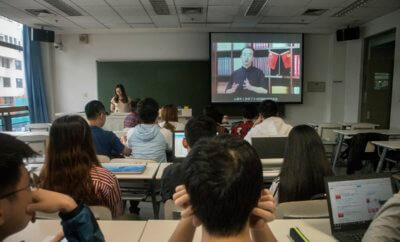Education
China to Allow Foreign Students to Take Part-Time Jobs

Shanghai skyline
Photo: Bigstock
The move aims to make the country's higher educational system more attractive, the Ministry of Education told China Daily.
China is going to allow international students to work on a part-time basis while they pursue their academic courses in the country’s universities. The move aims to make the country’s higher educational system more attractive, the Ministry of Education said in a statement provided to China Daily exclusively.
The Chinese government has been introducing steps to allow foreign students in Beijing and Shanghai to take part-time jobs or internships off campus after getting permission from their academic institutions and the entry and exit administrative authorities, the report added.
China will allow international students at Chinese universities nationwide to take part-time jobs during their studies to make the country's higher educational system more attractive, according to China Daily citing a statement from the Ministry of Education pic.twitter.com/yRlueBa1Ys
— People's Daily, China (@PDChina) August 7, 2018
About 442,000 foreign students from 205 countries or regions studied in China’s schools and other education institutions in 2016, PTI reported, citing official figures. Over 11 percent of them received government scholarships.
The number of Indian students in the country is also increasing. China is receiving more students from India than the United Kingdom, the Times of India reported earlier this year. As many as 18,171 Indian students were studying in China in 2016 while the corresponding number in UK institutions was 18,015, the publication said. The number of Indians studying in China rose from 765 a decade ago to 16,694 in 2015, it added.
Most Indian students go to China to pursue courses in medicine, due to the lower costs involved as compared to private medical colleges in India, PTI reported.
The maximum number of students in China come from South Korea, followed by the United States. Thailand is the next major source country, ahead of Pakistan and India, according to TOI.
China is expected to host more than 500,000 international students by 2020, according to a Times Higher Education World University Rankings report issued in 2017.
The country is bringing in various important changes into its education policy to attract more students from foreign countries. In 2015, a pilot policy implemented by Shanghai allowed international graduates of a Chinese university to accept internships or to launch their own business in the Zhangjiang National Innovation Demonstration Zone for up to two years after graduation, the China Daily report added. The city then expanded the policy in 2016 to allow foreign students to start a business at the zone during their studies.
The Ministry of Public Security also introduced a policy in 2016, under which foreign students in Beijing who were recommended by their universities could take up part-time jobs with companies in the city’s Zhongguancun Science Park or get involved in entrepreneurship, following which they would get an annotation of “entrepreneurship” added to their student visa, according to the publication.
“It makes sense for the country to more broadly expand such innovative policies since it serves the strategy of reinvigorating China’s workforce development,” the report quoted Wang Huiyao, Director of the Center for China and Globalisation, a Beijing-based independent think tank, as saying. “Foreign employees can give domestic enterprises an advantage as they expand overseas, plus it’s only logical that these graduates want to put into practice what they have learned,” he added.



